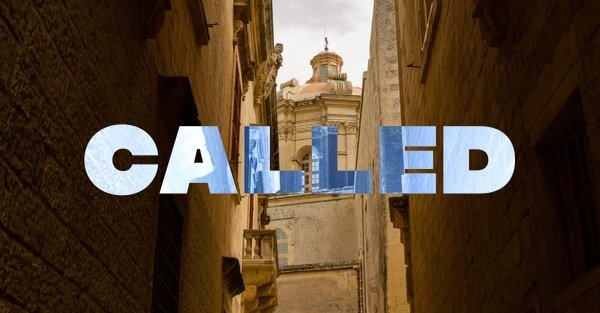1 Timothy 1:12-17
Paul’s Gratitude for God’s Mercy
12 I thank Christ Jesus our Lord, who has given me strength to do his work. He considered me trustworthy and appointed me to serve him, 13 even though I used to blaspheme the name of Christ. In my insolence, I persecuted his people. But God had mercy on me because I did it in ignorance and unbelief. 14 Oh, how generous and gracious our Lord was! He filled me with the faith and love that come from Christ Jesus.
15 This is a trustworthy saying, and everyone should accept it: “Christ Jesus came into the world to save sinners”—and I am the worst of them all. 16 But God had mercy on me so that Christ Jesus could use me as a prime example of his great patience with even the worst sinners. Then others will realize that they, too, can believe in him and receive eternal life. 17 All honor and glory to God forever and ever! He is the eternal King, the unseen one who never dies; he alone is God.
Amen.
Watch Video: https://www.youtube.com/watch?v=91EqPub0haY&t=18s
God Uses Broken People | Shawn Johnson
• Have you ever thought that “I really want to be used by God to do something that matters, but I’m so messed up I don’t know if that’s actually possible?”
• Have you ever thought “I want to have a funeral where people are lined up to get a microphone and say that he actually changed my life and I want to tell you how he changed my life?” but then you say to yourself “who am I kidding, I’m just me and I’m too broken for something like that.”
• ANNOUNCEMENT: God uses broken people. (Tweet it out, pass it on to a friend, because it’s true!). Hear yourself say those words!
• Saved at 24 years old – didn’t grow up in church. Joined an intern program, found out it was to become a Pastor!
• At age 27, preached my heart out. On the way home, a guy pulledout in front of me – I lost it! My friend rolls the window down “get in the car, you preached about the love of God 6 minutes ago!” Oh,wait a second, I’m a pastor, in a small town!
• Who am I kidding? Of course, I want to do something that matters. The truth is: I just know how screwed up I am.
• Some of you, that’s why you haven’t put your faith in Jesus yet. You’re checking out church, checking this whole God thing out, but you can’t get rid of this thought, “Who am I kidding, He wouldn’t want me.”
• Some of you have been saved for more years than you remember, and you had a bad month, and you’re asking the same question.
• The apostle Paul knew we would struggle with this stuff. He is talking to his friend, Timothy, he says “Timothy you’re gonna battle with this stuff, you’re gonna feel like you’re not enough, let me talk you through this, let me set you up for success, until you can get past this thought of ‘I’m not enough to be used by God’, you’ll never walk in the confidence that God wants you to.”
• “Of whom I am the worst”. This is a guy who started churches across the known world! Paul was crazy used by God! But he knows what it feels like to feel like the worst sinner in the world.
• If God can save me, God can save You! Trust me!
• Paul had a past – Google him or read your Bible.
• Let the Creator of the Universe speak to you right now, because you got this thing inside of you going “I think I need God, but I don’t think He would want me” but can you just hear: “EVERYONE.”
• Romans 10:13 “Everyone who calls on the name of the Lord will be saved.”
• If God can use me, God can use You!
• 1 Timothy 1:12-14
• He chose me, even though I just told you how screwed up I was. The grace of the Lord was poured out on me abundantly…
• Galatians 1:13 – he keeps telling everyone about his past, why? Because he wants everyone to understand: your past has nothing to do your present and the plans God has for your future, other than He’s gonna use it for your benefit.
• You don’t have a past that God can’t use, redeem, or forgive.
• I believe God has forgiven my past, but my problem: I’m still not that good in the present.
• 2 Corinthians 5:17.
• Romans 7:14-15; “I know all God’s commands are spiritual, but I am not.” Ever felt that?
• The feelings are real! I wanna be used by God and I feel real inadequate and they’re both happening at the same time, so now what?
• The answer: 2 Timothy 1:9, “He has saved us and called us to a holy life-not because of anything we have done but because of his own purpose and grace…”
• Decide to let the word of God trump my feelings! It’s not about my goodness, it’s about my God’s grace and He calls me anyway.
• Jesus came to flip things right side up. We have this upside-downthinking, “I’m just too broken to be used by God.” God wants to flip that right side up.
• God uses us because of our brokenness!
• Pick up everything you’ve been through because what you’ve been through is what I’m calling you to.
• Paul wants us to walk with some confidence. 1 Corinthians 1:3-4, “so that we can comfort those in any trouble with the comfort we ourselves receive from God.” You’re gonna struggle. But He isn’tgoing to waste one ounce of struggle.
• That person is going through what I went through, and God helped me, so I can help them, let’s go change the world! It’s because of what I’ve been through that makes me better at what God’s calling me to.
1. Moses had a past in Egypt. Where does God call Moses to go doministry? Egypt.
2. Peter denied Jesus 3 times; biggest mistake of his life. What did Jesus do? Sends him back to the very people he denied Jesus to. He took his past and added purpose to it.
3. Paul thought Jesus was such a joke he decided to kill anybody who puts their faith in Him. So what’s God do? Sends him to places where everybody thinks Jesus is a joke. God says, because nobody understands what they are feeling better than you do. So, where your biggest regrets are, we are going to send you back to and turn it into your biggest source of ministry.
• Because of what you’ve been through, you’re gonna be better at where I’m taking you.
• My brokenness is not a list of reasons why God can’t use me… It’s a resume of all the reasons how He can!
• We have a God that redeems our past. He flips it right side up.
• What you’ve been through often dictates what you’re called to!
• He doesn’t want to use us in spite of our brokenness.
• Genesis 50:20, it’s going to be your story. “You intended to harm me, but God intended it for good to accomplish what is now being done, the saving of many lives.”
• Embrace this – what Satan thought he’d take me out with, is now going to make me better at what God is calling me to do and I’m going to go change somebody’s world today.
• If you were God, who would you want to use: the guy that has his life so put together that he barely needs to lean on you? Or the guy so broken that he knows his only shot is to lean on you every step of the way?
• We are all broken. But read the Bible, He uses broken people.
• What happens when we share our brokenness? Somebody is going to say, “they understand”.
• Stop being so embarrassed about our struggles. That’s not the end of our story. We have a really good God.
• 2 Corinthians 12:9-10, “Each time he said, “My grace is all you need. My power works best in weakness.” So now I am glad to boast about my weaknesses, so that the power of Christ can work through me.”
• We exist to make heaven more crowded.
• Church is not a county club; it’s not looking for members – it’s looking for people to embrace their past mistakes and use it to help others!
Discussion Questions:
• Have you ever felt that you wanted to be used by God to do something that matters? Yes/No? Explain.
• Have you ever thought about what your funeral will be like? How do you want to be remembered? Explain.
• Do you believe that God uses broken people? Why or why not? Explain.
• People can feel so guilt-ridden by their past that they think God could never forgive and accept them. But consider Paul’s past. He had scoffed at the teachings of Jesus and had hunted down and murdered God’s people before coming to faith in Christ (Acts 9:1-9). God forgave Paul and used him might for his Kingdom; no matter how shameful your past, God also can forgive and use you. Agree/Disagree?
• Jesus didn’t’ come to show us how to live better lives, He came to forgive sinners and offer salvation. Agree/Disagree? Have you accepted his offer?
• People won’t believe the gospel if they can’t see it impacting and working in your life. Agree/Disagree?
• How has Christ shown you patience? Did He stay with you when you doubted? Don’t be afraid to let others know what Christ has done for you in your life!
• What is blocking you from getting closer to Christ?
• Biggest take away?








































